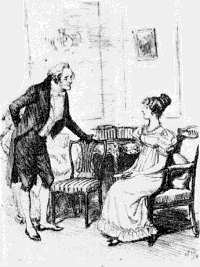Emma Woodhouse

'A heroine whom no-one but myself will much like', Jane Austen called her eponymous heroine when she was writing Emma. But I did like Emma, very much, despite her faults of snobbery and vanity. She is an affectionate and patient daughter, a delightful aunt, and a loving friend. But it is the play of her mind that perhaps entrances us most.
I have had just finished reading Emma and must tell you all about the enjoyment that lies in picking up the clues and being amused by Emma's obliviousness to what is going on under her nose. The clues are all there, so well hidden by Jane Austen that they make no impression before the secret is known, and yet so precise that we cannot accuse her of leading us astray.
Though her novels are known for their relatively small scale and controlled emotion, few authors inspire such extremes of feeling as Jane Austen. Emma opens as if it will be a simple narrative about a young woman who is handsome, clever, and rich, but it becomes instead a penetrating study of the human capacity for self-deception, self-knowledge, and love.
Austen never allows us to forget how high the stakes are for marriageable young women, whose only power in this society is consenting to or refusing the men they attract. A woman's social, economic, and emotional future is almost wholly determined by her marriage, as illustrated by the marriages of Mr. Elton and Miss Hawkins, Frank Churchill and Jane Fairfax, and Robert Martin and Harriet Smith. Emma's own development is revealed primarily through her reactions to her romantic prospects.
Emma also illustrates the potential conflicts between an ethical life and society's demands. Emma and Mr. Knightley's marriage unites the two, but the convoluted plot leading to it implies the unlikeliness of such a pairing. The novel suggests that true communication and real connections between people are difficult to achieve. The misunderstandings that drive much of the plot, while superficially comic, also highlight the disasters that can result from miscommunication. To what extent misunderstandings are inevitable and to what extent they result from a society's way of organizing itself is a puzzle that lingers long after we lay the book aside.

0 Comments:
Post a Comment
Subscribe to Post Comments [Atom]
<< Home